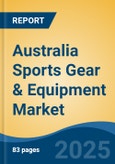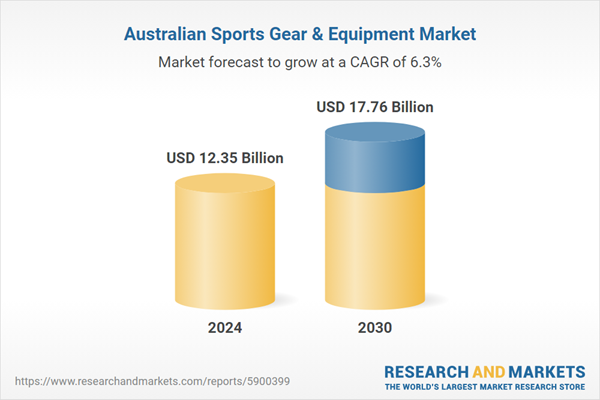Speak directly to the analyst to clarify any post sales queries you may have.
10% Free customizationThis report comes with 10% free customization, enabling you to add data that meets your specific business needs.
Key Market Drivers
Growing Health and Fitness Awareness
An increasing focus on health and fitness among Australians is a key force driving growth in the sports gear and equipment market. Rising concerns over health issues such as obesity, heart disease, and diabetes are motivating individuals to adopt more active lifestyles. As a result, activities like gym workouts, running, cycling, and home-based fitness routines are gaining popularity, leading to increased sales of sportswear, fitness trackers, mats, and weights. Public and private sector initiatives aimed at promoting physical well-being across all age groups further support this movement. This shift towards wellness is not a passing trend but a fundamental transformation in consumer behavior, sustaining long-term demand for fitness gear.Key Market Challenges
Economic Uncertainty and Consumer Spending Patterns
Economic instability remains a major challenge for the Australia Sports Gear & Equipment Market, as it directly impacts consumer purchasing behavior. During financial downturns or crises such as the COVID-19 pandemic, reduced disposable income leads consumers to deprioritize non-essential items, including premium or specialized sports equipment. This shift compels retailers and manufacturers to recalibrate pricing models, product assortments, and inventory strategies to match changing demand patterns. Additionally, pandemic-related restrictions disrupted sports activities and supply chains. While home fitness equipment saw increased demand, inventory management difficulties persisted, requiring operational agility to align with evolving consumer preferences.Key Market Trends
Integration of Technology into Sports Equipment
The integration of technology into sports gear is emerging as a defining trend in the Australian market. Consumers increasingly favor products that enhance performance through smart features and digital connectivity. Fitness wearables, GPS-enabled devices, smart shoes, and interactive gym equipment are gaining traction across diverse demographics. These innovations allow users to track progress, monitor health metrics, and engage in data-driven fitness routines. In home settings, connected treadmills and bikes offer immersive experiences through app integration. As tech-savvy consumers embrace these advancements, demand for intelligent, user-friendly sports gear is expected to accelerate, positioning forward-looking brands for competitive advantage.Key Players Profiled in this Australia Sports Gear & Equipment Market Report
- Adidas Australia Pty Limited
- Nike Australia Pty. Ltd.
- Puma Australia Pty Ltd
- Rebel Sport Limited
- Kmart Australia Limited
- Sports Direct Pty Ltd
- Decathlon (Australia) Pty Ltd
- Asics Oceania Pty Ltd
- Wiggle Australia Pty Limited
- Kookaburra Sport Pty. Ltd.
Report Scope:
In this report, the Australia sports gear & equipment market has been segmented into the following categories, in addition to the industry trends which have also been detailed below:Australia Sports Gear & Equipment Market, by Type:
- Ball Over Net Games
- Ball Games
- Fitness/Strength Equipment
- Athletic Training Equipment
- Others
Australia Sports Gear & Equipment Market, by Sales Channel:
- Supermarkets/Hypermarkets
- Specialty Stores
- Online
- Others
Australia Sports Gear & Equipment Market, by Region:
- Australia Capital Territory & New South Wales
- Northern Territory & Southern Australia
- Western Australia
- Queensland
- Victoria & Tasmania
Competitive Landscape
Company Profiles: Detailed analysis of the major companies present in the Australia sports gear & equipment market.Available Customizations:
With the given market data, the publisher offers customizations according to a company's specific needs. The following customization options are available for the report.Company Information
- Detailed analysis and profiling of additional market players (up to five).
This product will be delivered within 1-3 business days.
Table of Contents
Companies Mentioned
The leading companies profiled in this Australia Sports Gear & Equipment market report include:- Adidas Australia Pty Limited
- Nike Australia Pty. Ltd.
- Puma Australia Pty Ltd
- Rebel Sport Limited
- Kmart Australia Limited
- Sports Direct Pty Ltd
- Decathlon (Australia) Pty Ltd
- Asics Oceania Pty Ltd
- Wiggle Australia Pty Limited
- Kookaburra Sport Pty. Ltd.
Table Information
| Report Attribute | Details |
|---|---|
| No. of Pages | 83 |
| Published | May 2025 |
| Forecast Period | 2024 - 2030 |
| Estimated Market Value ( USD | $ 12.35 Billion |
| Forecasted Market Value ( USD | $ 17.76 Billion |
| Compound Annual Growth Rate | 6.3% |
| Regions Covered | Australia |
| No. of Companies Mentioned | 11 |









